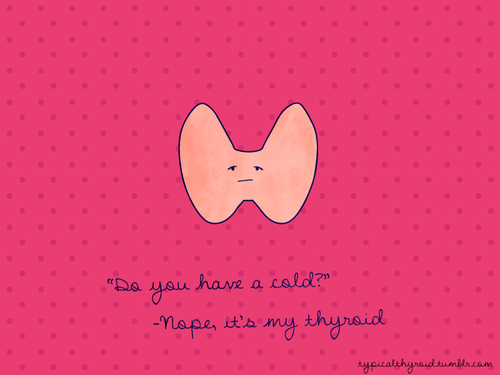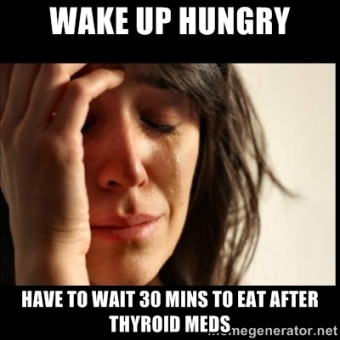
When you are living with thyroid disease, you are automatically more attuned to changes in your health. When you get a headache or your skin is dryer than usual, you have to ask yourself: is this a thyroid symptom or is it completely unrelated? All this speculation can lead to people calling you a hypo. No, not hypothyroid – hypochondriac.
What non-sufferers should understand is that the most ridiculous or seemingly insignificant change can be a sign of your thyroid playing up. Feeling unbearably hot or cold is a thyroid thing. Having crap hair or nails may not be a genetic curse, but a sign that your thyroid is giving up the ghost. WEIGHT PROBLEMS, though most accuse us of making excuses, are often linked to a crazy thyroid just messing around with us.
And those are the common symptoms! There are far more that are just bizarre. A yellow tinge in the skin could be from thyroid dysfunction, because it cannot convert beta-carotene into Vitamin A. Loss of the outer third of your eyebrow is a particularly weird one, but at least it’s one of the most recognisable symptoms of hypothyroidism.
HypothyroidMom recently posted this list of 300+ (honestly, really) hypothyroid related symptoms (Sarah Wilson also reposted it). Some symptoms are specific, some may contribute to a general malaise that is hard to diagnose. But the point is, the next time you complain about a headache, dry skin or even something as small as excess earwax, it’s not crazy to think it may be a thyroid thing.
If you like, you can also print out this list to and give to anyone (including your doctors) who says you’re overreacting or “trying” to find something wrong. But that’s just a suggestion.
Energy level and sleep:
Chronic fatigue
Less stamina than others
Long recovery period after any activity
Inability to concentrate
Sleep apnea
Snoring
Insomnia
Need naps in the afternoon
Weakness
Wake feeling tired
Frequently oversleep
Weight:
Weight gain
Inability to lose weight
Ascites (abdominal fluid accumulation)
Metabolic Syndrome
Weight loss
Anorexia
Heightened appetite
Diminished appetite
Obesity
Body temperature:
Cold extremities
Cold sweats
Night sweats
Heat intolerance
Cold intolerance
Internal shivering
Hypothermia
Cold hands
Clammy palms
Cold feet
Low basal body temperature
Slowness:
Slow movements
Slowed Achilles reflex
Diminished reflexes
Slow speech
Infections:
Frequent infections
Chronic illness
Low immune system
Frequent colds
Frequent flus
Susceptibility to bronchitis
Hard time recovering from infections
Recurrent sinus infections
Recurrent skin infections
Recurrent ear infections
Recurrent nose infections
Recurrent throat infections
Candida (yeast)
Pelvic Inflammatory Disease (PID)
Repeated urinary tract infections
Upper respiratory tract infections
Related autoimmune or endocrine diseases:
Celiac disease
Type 1 Diabetes
Type 2 Diabetes
Insulin Resistance
Addison’s disease
Cushing’s disease
Premature ovarian decline
Premature ovarian failure
Alopecia
Reynaud’s syndrome
Sjögren’s syndrome
Chronic fatigue syndrome
Rheumatoid arthritis
Systemic lupus erythematosus
Multiple sclerosis
Sarcoidosis
Scleroderma
Vitiligo
Psoriasis
Swelling and thickened skin of:
Eyes
Face
Lips
Neck
Hands
Arms
Legs
Feet
Ankles
Mouth and throat:
Difficulty swallowing
Sensation of lump in throat
Sensation of pressure on throat
Pain and tenderness in neck and/or thyroid area
Goitre (enlargement of the thyroid gland in neck)
Burning sensation in throat
Sore throats
Swollen tongue
Choking fits
Distorted sense of taste (Dysgeusia)
Salt cravings
Sweet cravings
Speech problems
Dry mouth
Halitosis (bad breath)
Propensity for cavities
Propensity for gum disease
Low, husky, hoarse voice
Bleeding gums
Receding gums
Irritated gums
Swollen gums
Persistent teeth clenching
TMJ
Ears:
Oversensitive hearing
Noises in ears (hissing, ringing)
Deafness
Tinnitus
Internal itching of ears
Dry, scaly ear canal
Excess earwax
Vertigo
Eyes:
Poor focusing
Double vision
Dry eyes
Gritty eyes
Achy eyes
Blurred vision
Drooping eyelids
Sensitive to light
Frequent tics in the eyes
Spasms of the eyelids
Bulging of the eyeballs
Red inflamed eyes
Dark rings under eyes
Puffiness around the eyes
Rapidly shifting gaze making you feel dizzy
Problems with night vision
Glaucoma
Cataracts
Hair:
Body hair loss
Head hair loss
Dry hair
Brittle hair
Coarse hair
Finer hair
Premature baldness
Premature gray hair
Eyelash loss
Thinning or loss of outside third of eyebrows
Nails:
Brittle
Pale
Soft
Yellowish
Ridged
Striated
Thickened
Ingrown toenails
Skin:
Dry skin
Dry itchy scalp
Flaky skin
Cracked heels
Coarse patches
Yellowish or amber tint to their skin
Dry mucous membranes
Pale skin
Pale lips
Boils
Pigmentation in skin creases
Rashes
Skin tags
Dermographia (wheals)
Eczema
Impetigo
Cellulitis
Easy bruising
Tendency to form blood clots
Slow wound healing
Hemophilia
Bumps on legs
Acne on face
Breakout on chest and arms
Raynaud’s Phenomenon (discoloration of digits)
Chronic itching
Varicose veins
Premature aging
Parchment-like fine wrinkles
Red butterfly patch over cheeks and nose
Absence or diminished perspiration
Moles and warty growths
Vitiligo
Allergies
Hives
Numbness and tingling:
Legs
Feet
Arms
Hands
Back
Face
Pain:
Migraines
Chronic headaches
Chronic back and loin pain
Wrist pain
Muscles and joint pain
Carpal Tunnel Syndrome (hands or forearms)
Tarsal Tunnel syndrome (legs)
Joint stiffness
Tendonitis
Heel spur
Plantar fasciitis
Arthritis
Gout
Painful soles of feet
Muscle cramps
Aching bones
Aching muscles
Joint pain
TMJ
Fibromyalgia
Digestion:
Hard stools
Constipation
Hemorrhoids
Loss of appetite
Food allergy
Food sensitivity
Alcohol intolerance
Irritable Bowel Syndrome (IBS)
Lactose intolerance
Celiac Disease
Gluten Sensitivity/Intolerance
Colitis
Abdominal distention
Weight gain in abdominal area
Protruding abdomen in children
Diverticulosis
Excess gas
Flatulence
Nausea
Ulcers
Acid Reflux
Excessive belching
GERD (Gastroesophageal Reflux Disease)
Menstrual disorders:
Cessation of periods (amenorrhoea)
Scanty (light) periods (oligomenorrhoea)
Heavy periods (menorrhagia)
Irregular periods
Very short cycles
Very long cycles
Severe cramping
Failure to ovulate
Constant bleeding
Premenstrual syndrome (PMS)
Premenstrual tension (PMT)
Extreme bloating and water retention
Premature or delayed puberty
Premature or delayed menopause
Difficult menopause
Hysterectomy
Endometriosis
Ovarian fibroids
Polycystic ovary syndrome (PCOS)
Reproductive disorders and pregnancy:
Infertility
Miscarriage
Still birth
In vitro fertilization failure
Donor egg failure
Abnormal estrogen levels
Abnormal progesterone levels
Abnormal testosterone levels
Drop in sperm count
Erectile dysfunction
Loss of libido
Sexual dysfunction
Vaginal dryness
Painful sex
Breasts leaking milk (but not lactating or breastfeeding)
Fibrocystic breast disease
Maternal anemia
Gestational diabetes
Pre-eclampsia
Placental abruption
Postpartum hemorrhage
Prolonged labor
Inability to dilate
Poor wound healing
Pain in and around c-section scar
Difficulty breast-feeding
Low breast milk supply
Premature birth
Low birth weight
Long gestation
High birth weight
Newborn with deficits in intellectual development
Newborns with jaundice
Autism
ADD/ADHD
Birth defects
Emotional:
Tension
Irritability
Wanting to be solitary
Mood swings
Anxiety
Personality changes
Feelings of resentment
Jumpy
Easily startled
Lack of confidence
Nervousness
Other related conditions:
Poor adrenal function
Anemia
Hyponatremia (low blood sodium)
Lack of coordination
Clumsiness
Tendency to fall
Dizziness
Fainting episodes
Vertigo
Tremor
Growth disturbances in children
Chronic allergies
Chemical sensitivities
Restless Leg Syndrome
Rhabdomyolysis (destruction of skeletal muscle)
Scoliosis
Osteoporosis
Hernia
Brain:
Depression
Panic attacks
Memory loss
Confusion
Brain fog
Mental sluggishness
Poor concentration
Noises and/or voices in head
Hallucinations
Delusions
Mania
Phobias
Obsessions
Alcohol & substance abuse
Rage
Loss of drive
Personality disorders
Schizophrenia
Postpartum Depression
Seasonal Affective Disorder (SAD)
Nightmares
Bipolar
Suicide
ADHD
Dementia
Alzheimer’s Disease
Parkinson’s Disease
Kidney and bladder:
Albuminuria (protein in urine)
Urinary incontinence
Frequent need to urinate
Decreased output of urine
Interstitial cystitis (chronic bladder problems)
Urinary incontinence while sleeping
Kidney stones
Recurrent kidney infections
Recurrent bladder infections
Irritable bladder syndrome
Chronic kidney failure
Gallbladder:
Gallbladder Disease
Gallstones
Liver:
Liver tenderness and enlargement
Congestion of the liver
Elevated liver enzymes
Hypoglycemia
Lungs:
Asthma
Bronchitis
Emphysema
Difficulty breathing
Air hunger
Pleural effusion (fluid around the lung)
Shortness of breath
Tightness in chest
Pneumonia
Heart:
High blood pressure
Low blood pressure
Slow/weak pulse (under 60 bpm)
Fast pulse (over 90 bpm at rest)
Arrhythmia (irregular heartbeat)
Skipped beats
Heart flutters
Heart palpitations
Chest pain
High cholesterol
High triglycerides
High LDL (“bad”) cholesterol
Mitral Valve Prolapse
Atherosclerosis
Coronary Artery Disease
Elevated C-Reactive Protein
Fibrillations
Plaque buildup
Fluid retention
Poor circulation
Enlarged heart
Congestive Heart Failure
Stroke
Heart Attack
Cancer:
Skin Cancer
Thyroid Cancer
Prostate Cancer
Endocrine Cancers
Lung Cancer
Breast Cancer
Wow! Does that cover it? Let us from your own experience if they’ve left anything off this list.







































































